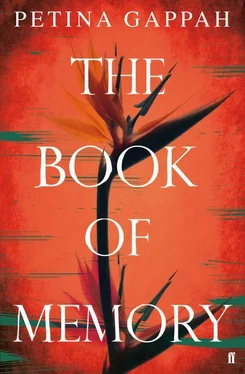For every day that I knew him, Sandy wore a cricket jersey and cream flannel trousers with white canvas shoes. He was going bald but that did not prevent him from wearing what little remained of his hair long, reaching his shoulders, while at the same time affecting one of those sweep-overs that are supposed to give the illusion of hair. He looked like a cross between the incarnation of Doctor Who played by Peter Davison and a male version of Miss Havisham.
I had no facility at all for music and never got beyond the basics. I preferred to be riding or reading instead of doing endless scales. It was just as well, because Sandy was not a particularly good teacher.
A typical lesson would see me sitting at the piano, hitting the wrong notes while Sandy winced in mock pain. He would then show me how to play it right, then he would play another piece to illustrate the mechanics of the first, and then another piece, and yet another, until he ended up playing his favourite songs to me, before ending the lesson with, ‘There, dear child, you see how really simple it is.’
After the lesson, I ate Sandy’s biscuits and drank Mazoe while he talked about the play he had seen that week. ‘You should have seen it, dear one — oh, the spectacle, the impact!’
We soon abandoned all pretence of lessons, and instead I sat while he showed me his albums of press cuttings. When he was feeling less cheerful, he talked at length about Eastern mysticism, about chakras and auras and transcendental meditation. He had also met Lord Lucan and dined with him on a tea estate in Kenya. ‘Sat there, he did, quiet as anything,’ Sandy said. ‘Not a peep from him. Not one blasted word to anyone the whole evening. Smoked a hundred cigarettes if he smoked one.’
With Liz I passed my time much more profitably, riding on the Umwinsidale downs or in her dog-smelling house, looking through her jockeys’ autographs. Pride of place went to Lester Piggott, Fernando Toro and Johnny Sellers, who had all been racing at one time or the other at Borrowdale Park.
I loved the story of the peppered moth. I did not see it then as science, but as a story, simplified in my mind so that I saw always the same moth fluttering through time, Biston betularia, the predominantly white-coloured moth with its dark speckles perching on the clean trees of pre-industrial England, more common and surviving longer than its predominantly black-coloured cousins.
Then, as mankind progressed and machines spewed the triumph of their industrial ingenuity into the countryside, soot collected on the trees and the black-coloured moths with white speckles prevailed over their white cousins, survived hidden from predatory birds, camouflaged by the soot of ages. And as England cleaned itself up again, the predominantly white-coloured moth reappeared.
I loved the story of the peppered moth because it seemed to me that it was the only creature that understood what it was to be black and white. Like the peppered moth, I adapted to my changing environments. Then Poppy had that last fateful stroke and died, and Lloyd and I met Zenzo and everything changed between us.

More than fifty women came in two trucks last Thursday, an unusually large number to arrive all at once. They chanted, danced and ululated as they entered the prison. The guards were forced to dispense with the usual routine.
Synodia’s voice was drowned out by the chanting and singing. They were simply herded into the cells as they were. There were not enough uniforms for all the women, so they were spared the humiliation of casting off their clothes while Mathilda and Patience examined their naked bodies.
They sang all night and stamped their feet. In the canteen in the morning, they shook their bottoms at the guards as they performed vulgar dances to popular church songs, replacing the Satan of the original lyrics with the government.
Their arrival was our first real imitation of the upheavals outside Chikurubi. For the last year, the election has been just another thing happening outside, an external event that has little to do with our reality here. With these new prisoners, the election finally came to the prison. They were all supporters of the opposition party and had been rounded up by the police after a riot in one of the townships. Their frenzied denunciations of the government, their fearless confidence, were our first intimation that there might be change on the horizon.
The new prisoners had not learned that the only response is deference — instant and absolute deference — eyes down, humility in every movement, submission in the tone of voice. At the prayer meeting the next morning, the women interrupted Synodia with long and loud prayers interlaced with political slogans. When Synodia tried to lead them in a song, they openly defied her. Instead, they sang their own party songs. Two of the women stood with their backs to Synodia, shaking their bottoms in rhythm to the music.
At breakfast, they refused to eat the food and instead sang and jumped on the tables. Truncheons and whistles failed to quell the riot, and it was only after Synodia called for guards from the men’s section that any order was restored at all.
We spent the weekend in lockdown, leaving only when the guards from the male section came to shepherd us to meals. On Monday morning, the guards came back and pushed the new women roughly out of the cells and into the truck. I thought they were going to court, but Loveness told me that they were simply being moved to another place. ‘It’s how they deal with these opposition people,’ she said.
*
He is very successful now, Zenzo. If you know any of our artists, you will know him, because he is the most famous of them all. Perhaps you know him by that other, longer name, the new name that he gave himself to show the world that he is authentically authentic, genuinely genuine in the genuine fullness of his authentic Africanness.
He has had exhibitions round the world. Once, in a small gallery in Melbourne, I walked in and found myself face to face with his work. Another time, in London, I picked up the Review , the magazine that came with the Observer , and found him smouldering at me from the cover. ‘His single-mindedness is impressive,’ said his interviewer. Indeed it is.
When I think of him, I sometimes think of his girlfriend. Poor Sigrid. He mocked her often, imitating her accent, making sounds that he claimed she made when they were having sex. I did not see this as the cruelty that it was. I did not question at all that this was a violation of the worst kind. I thought she deserved it because she had what she had no right to: him. Sigrid was important to him, of course, because she was his ticket out of the country.
Lloyd and I were mere conveniences, but Sigrid was a necessity. When I look back to how things were between us, I have to face the reality that the only reason he was ever with me was because I pretty much threw myself at him and said, here I am, take me. The only reason that he ever looked at me at all was because I presented myself to him. I made myself available to him.
As I said, he is a famous artist now. He has been commissioned to paint huge, expensive murals in cities like Berlin and Tokyo and Geneva. People who know these things, the in-people, know that distinctive slashed-Z signature.
‘I fled with nothing but the paint-splattered clothes that I had on,’ he said in one interview.
His career has risen with our country’s collapse. His paintings are different from the realist paintings that he said he wanted to paint. It is all tortured faces and screaming mouths now, slashed genitals and dismembered breasts. ‘Evocative images of his tortured homeland,’ as the reviewers will have you believe.
Читать дальше













